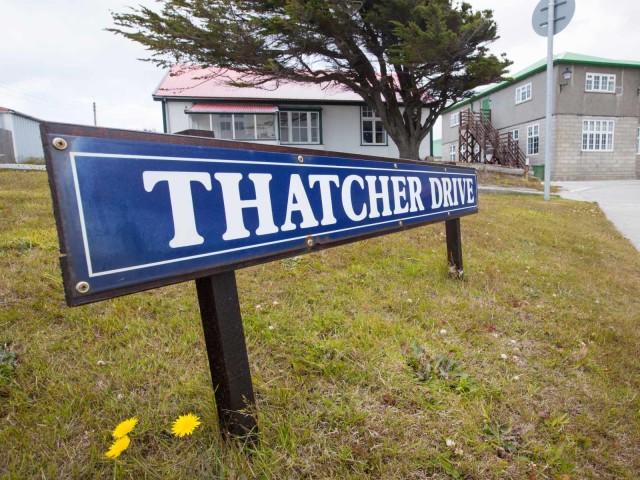October 31, 2025
Happy 100th, Maggie!
Reflecting on the multifaceted legacy of the Iron Lady.


To the point!

The Iron Lady’s 100th birthday is a fitting moment to reflect on the reasons – and consequences – of abandoning the political center.
There is arguably no political figure who fundamentally reshaped her country as much as Margaret Thatcher did during her tenure as British Prime Minister from 1979 until her forced resignation in 1990. Few leaders have been more polarizing – though a certain U.S. President has lately surpassed all competition in the "controversy" category. This month marks what would have been the Iron Lady's 100th birthday. Her impact endures.
A country in decline
In the 1970s, Britain was a nation in steep decline: inflation, unemployment, frequent strikes, blackouts, and the humiliation of seeking a bailout from the International Monetary Fund. Both major political parties – the conservative Tories and Labour – broadly supported the post-war consensus. This approach aimed for full employment and included significant union involve-ment in economic policy decision-making. Strategic industries were kept under state control, no matter how unprofitable they became. If full employment was threatened, the government wouldn’t hesitate to pump in money.
The 1970s: Not-So-Great Britain
After the 1973 oil price shock, inflation spiraled out of control. The conservative government under Prime Minister Edward Heath attempted wage controls to combat the crisis. The unions responded with strikes. Heath backed down. The internal Tory rebellion this triggered vaulted Thatcher to party leadership in 1975 – and after the tumultuous “winter of discontent” to Downing Street in 1979. She was the first woman to hold the highest government office in the land. Socially, she was also an outsider within her own party of elites: Thatcher was the daughter of a provincial greengrocer from northern England. No Eton pedigree here – just an iron will.
The Thatcher revolution
The Iron Lady fiercely tackled all pressing issues. To combat inflation, she raised interest rates. Yes, you read that correctly: the Bank of England only gained independence in 1997 under Tony Blair. Thatcher accelerated privatizations and slashed public spending, particularly on social programs. Unlike her Tory colleague Edward Heath in 1974, Thatcher refused to give in to striking coal miners. The unions had no choice but to capitulate. Inflation was defeated (see Fig. 1), yet unemployment soared to 13%. Still, what saved Thatcher politically was Argentina: In 1982, it invaded the Falkland Islands, triggering a patriotic surge as Britain fought to retake them. This wave of national pride carried Thatcher to re-election in 1983. I remember it well – Union Jacks were everywhere. At the time, I was an exchange student in Wolverhampton, a struggling industrial town in the Midlands.
Fig. 1: Annual inflation in the United Kingdom
⬤ {series.name}: {point.y}
The dark side of the legacy
Thatcher undeniably revitalized Britain's economy. But she also fundamentally altered the nature of Anglo-American conservatism. Before her, the Tories stood for tradition and stable institutions. With revolutionary zeal, Thatcher reframed the debate: “There is no such thing as society, only individuals.” The old Tory virtues of balance, measured reform, and gradual progress were sacrificed on the altar of radical disruption. As revolutions often devour their own, Thatcher, too, was ousted by her own party in 1990. Her uncompromising approach had simply become too much for her party.
Yet, the seeds of division she planted continued to grow. The traditional Tories found themselves unable to resist the pull of radical disruptors. Over time, the party was captured by hardline Brexiteers, even though the Conservatives had historically been pro-European. Indeed, it was Heath who led Britain into the European Economic Community. But after leaving office, Thatcher became a vocal supporter of growing Euroscepticism from the sidelines, spurring her successors to accuse pro-European Conservatives of sabotage. Absolutism replaced compromise.
Fig. 2: Voting intention in the United Kingdom
September 2025
Without Thatcher, Brexit would probably not have happened. Yet it brought no favors to her party – and even less to the British economy. Following lackluster prime ministers, the Tories suffered a landslide defeat to Labour. To make matters worse, Nigel Farage's hard-right Reform UK party, born out of the Brexit movement, is now siphoning off Tory votes (see Fig. 2). In the short term, Thatcher saved the British economy. In the long term, she deepened the social divides in British society. Then again, she never believed in the concept of “society” in the first place.
In many ways, we’re seeing parallel dynamics unfold in the United States, where Ronald Reagan played the Thatcher role. The Iron Lady’s 100th birthday is a fitting moment to reflect on the reasons – and consequences – of abandoning the political center. Surely a topic worth considering in other countries, too.
Dr. Moritz Kraemer, Chief Economist / Head of Research at LBBW
Download To the point!
-
292.6 KB | October 31, 2025
This publication is addressed exclusively at recipients in the EU, Switzerland, Liechtenstein and the United Kingdom.
This report is not being distributed by LBBW to any person in the United States and LBBW does not intend to solicit any person in the United States.
LBBW is under the supervision of the European Central Bank (ECB), Sonnemannstraße 22, 60314 Frankfurt/Main (Germany) and the German Federal Financial Supervisory Authority (BaFin), Graurhein-dorfer Str. 108, 53117 Bonn (Germany) / Marie-Curie-Str. 24-28, 60439 Frankfurt/Main (Germany).
This publication is based on generally available sources which we are not able to verify but which we believe to be reliable. Nevertheless, we assume no liability for the accuracy and completeness of this publication. It conveys our non-binding opinion of the market and the products at the time of the editorial deadline, irrespective of any own holdings in these products. This publication does not replace individual advice. It serves only for informational purposes and should not be seen as an offer or request for a purchase or sale. For additional, more timely in-formation on concrete investment options and for indi-vidual investment advice, please contact your investment advisor.
We retain the right to change the opinions expressed herein at any time and without prior notice. More-over, we retain the right not to update this information or to stop such updates entirely without prior notice.
Past performance, simulations and forecasts shown or described in this publication do not constitute a reliable indicator of future performance.
The acceptance of provided research services by a securities services company can qualify as a benefit in supervisory law terms. In these cases LBBW assumes that the benefit is intended to improve the quality of the relevant service for the customer of the benefit recipient.
Additional Disclaimer for recipients in the United Kingdom:
Authorised and regulated by the European Central Bank (ECB), Sonnemannstraße 22, 60314 Frank-furt/Main (Germany) and the German Federal Financial Supervisory Authority (BaFin), Graurheindorfer Str. 108, 53117 Bonn (Germany) / Marie-Curie-Str. 24-28, 60439 Frankfurt/Main (Germany). Authorised by the Prudential Regulation Authority. Subject to regulation by the Financial Conduct Authority and limited regulation by the Prudential Regulation Authority. Details about the extent of our regulation by the Prudential Regulation Authority are available from us on request.
This publication is distributed by LBBW to professional clients and eligible counterparties only and not retail clients. For these purposes, a retail client means a person who is one (or more) of (i) a client as defined in point (7) of Article 2(1) of the UK version of Regulation (EU) 600/2014 which is part of UK law (UK MiFIR) by virtue of the European Union (Withdrawal) Act 2018 (EUWA) who is not a professional client (as defined in point (8) of Article 2(1) of UK MiFIR); or (ii) a customer within the meaning of the provisions of the Financial Services and Markets Act 2000 (as amended, the FSMA) and any rules or regulations made under the FSMA (which were relied on immediately before the 31 December 2020 (IP completion day)) to implement Directive (EU) 2016/97 on insurance distribution, where that customer would not qualify as a professional client, as defined in point (8) of Article 2(1) of UK MiFIR; or (iii) not a qualified investor as defined in the UK version of Regulation (EU) 2017/1129 on the prospectus to be published when securities are offered to the public or admitted to trading on a regulated market, which is part of UK law by virtue of the EUWA (the UK Prospectus Regulation).
This publication has been prepared by LBBW for information purposes only. It reflects LBBW’s views and it does not offer an objective or independent outlook on the matters discussed. The publication and the views expressed herein do not constitute a personal recommendation or investment advice and should not be relied on to make an investment decision. The appropriateness of a particular investment or strategy will depend on an investor’s individual. You should make your own independent evaluation of the relevance and adequacy of the information contained in this publication and make such other investigations as you deem necessary, including obtaining independent financial advice, before partici-pating in any transaction in respect of the financial instruments referred to this publication herein.
Under no circumstance is the information contained within such publication to be used or considered as an offer to sell or a solicitation of an offer to buy any particular investment or security. Neither LBBW nor any of its subsidiary undertakings or affiliates, directors, officers, employees, advisers or agents accepts any responsibility or liability whatsoever for/or makes any representation or warranty, express or implied, as to the truth, fullness, accuracy or completeness of the information in this publication (or whether any information has been omitted from the publication) or any other information relating to the, whether written, oral or in a visual or electronic form, and howsoever transmitted or made available or for any loss howsoever arising from any use of this publication or its contents or otherwise arising in connection therewith.
The information, statements and opinions contained in this publication do not constitute or form part of a public offer. LBBW assumes no responsibility for any fact, recommendation, opinion or advice con-tained in any such publication and expressly disclaims any responsibility for any decisions or for the suitability of any security or transaction based on it. Any decisions that a professional client or eligible counterparty may make to buy, sell or hold a security based on such publication will be entirely their own and not in any way deemed to be endorsed or influenced by or attributed to LBBW.
LBBW does not provide investment, tax or legal advice. Prior to entering into any proposed transaction on the basis of the information contained in this publication, recipients should determine, in consultation with their own investment, legal, tax, regulatory and accounting advisors, the economic risks and merits, as well as the legal, tax, regulatory and accounting characteristics and consequences, of the transac-tion.



